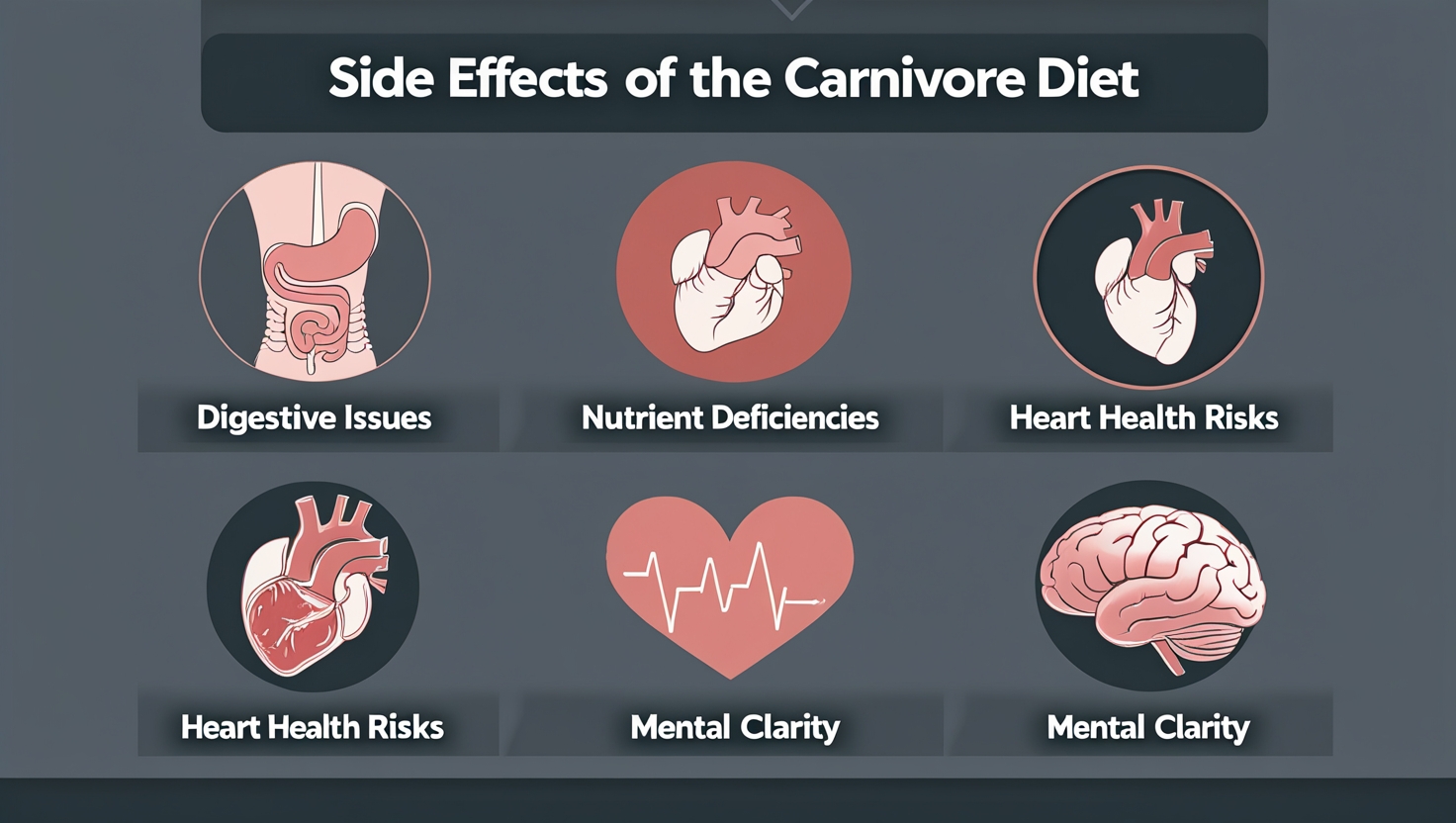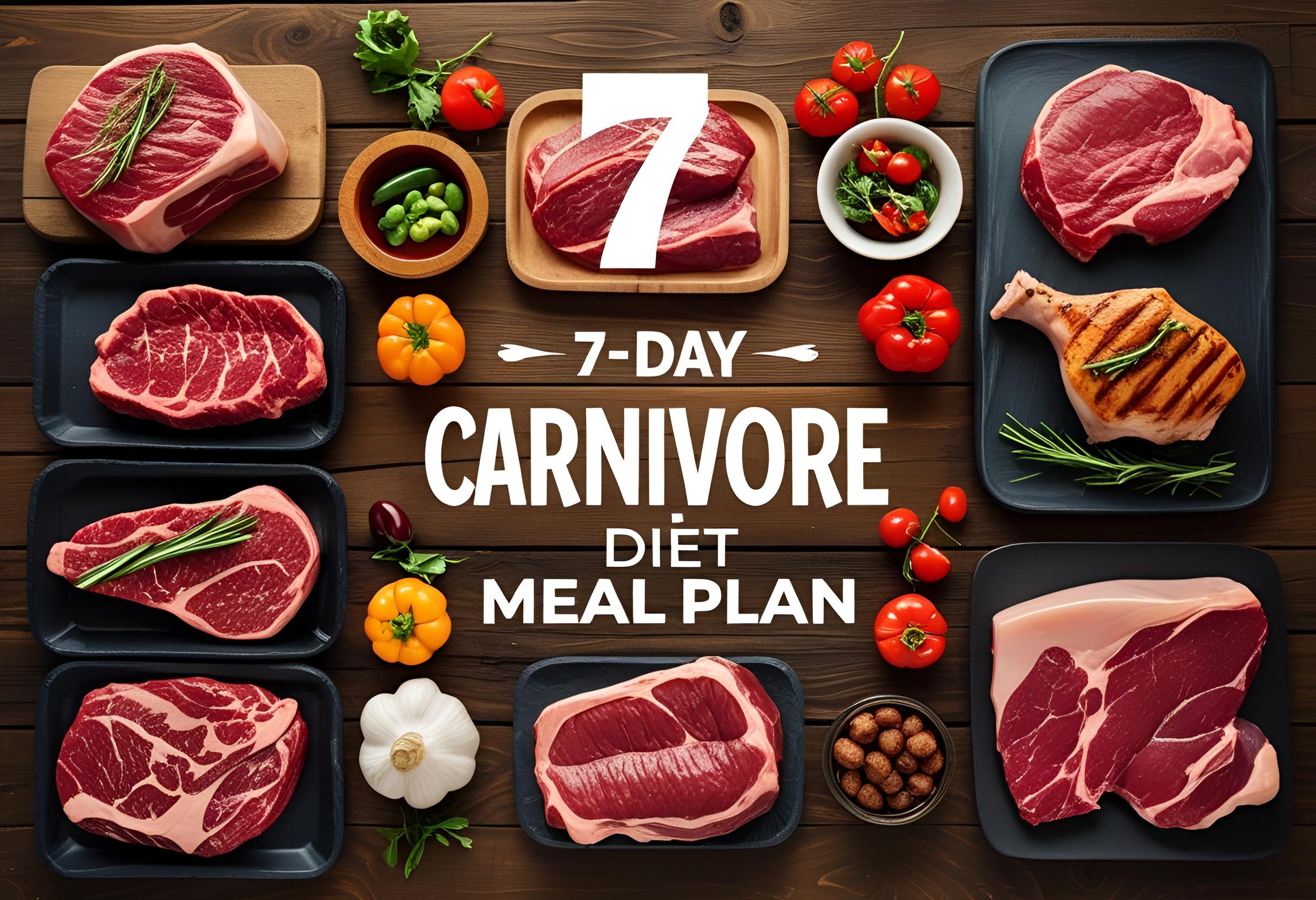Introduction: Is the Carnivore Diet Really Safe?
Carnivore Diet Side Effects are an important consideration before adopting this bold eating plan that eliminates all plant-based foods and relies solely on meat, fish, eggs, and some dairy products. While many promoters praise benefits like reduced inflammation, improved mental clarity, and rapid weight loss, it’s essential to understand the possible negative effects. This guide will explain everything you need to know about the Carnivore Diet Side Effects, including real risks, scientific findings, and frequently asked questions, so you can make an informed decision.
Carnivore Diet Side Effects You Should Know
1. Carnivore Diet Side Effects on Digestion: Fiber Deficiency Problems
Constipation is among the most common adverse effects people encounter. Due to the Carnivore Diet’s exclusion of foods high in fiber, such as fruits, vegetables, legumes, and whole grains, many people experience bloating, irregular bowel movements, and digestive pain. A chronic lack of fiber can also have a detrimental effect on gut health.
2. Vitamin and Mineral Deficiencies
Eliminating entire food groups may lead to shortfalls in essential nutrients like:
- Vitamin C (from fruits/vegetables)
- Vitamin K, E and Magnesium
- Potassium and Folate
This can result in symptoms such as fatigue, poor immune function, or even impaired bone health. Source: Healthline
3. Heart Health Concerns
Eating large quantities of red and processed meats — often high in saturated fat and cholesterol — may raise LDL (bad) cholesterol levels, potentially increasing the risk of cardiovascular disease over time. Though some followers report improvements, the long-term effects are still debated in the medical community.
4. Kidney and Liver Strain
Your kidneys may be under stress from a high-protein diet, particularly if you already have renal disease. Because extra nitrogen from amino acids must be processed, consuming too much protein may also raise the risk of renal stones and liver load.
5. Increased Risk of Certain Cancers
An increased risk of colon cancer has been associated with excessive consumption of red and processed meats. Processed meats are classified as carcinogenic by the World Health Organization (WHO), which warns anyone who regularly eats them to exercise caution.
6. Mood Swings and Mental Fatigue (Initially)
During the first few weeks, cutting off carbohydrates might lead to mood swings, irritation, and low energy. Your body and brain are adapting to using fats as the primary energy source rather than glucose, which is why this is frequently referred to as the “keto flu.”
7. Bad Breath and Body Odor
Your body may release pungent substances like acetone through perspiration and breath as a result of ketosis. People on ketogenic or zero-carb diets frequently experience this, which can be awkward in social situations.
8. Lack of Dietary Variety
Consuming the same few foods over and over again can lead to boredom, dissatisfaction, and social isolation. Long-term maintenance of this diet is extremely challenging, particularly in the absence of adequate preparation and medical monitoring.
9. Bone Health Risk
Over time, bone density may decrease if adequate intake of calcium, magnesium, and vitamin K2 is not maintained. Additionally, some research suggests that excessive meat consumption might cause acidic diets that weaken bones by removing nutrients.
10. Negative Environmental Impact
“Even though it’s not a physical symptom, it’s important to note that diets high in animal products have a larger carbon footprint and contribute more to climate change than plant-based diets.”
Who Should Not Try the Carnivore Diet?
The Carnivore Diet is not recommended for:
- People with kidney or liver disease
- Those with a history of heart problems
- Individuals with gout or high uric acid levels
- Anyone pregnant or breastfeeding (due to increased nutritional needs)
Balanced Alternatives to Consider
If you’re interested in low-carb diets but concerned about side effects, you might want to compare:
- Carnivore vs Keto Diet
- 7-Day Carnivore Meal Plan
- Carnivore Diet for Mental Clarity
- Carnivore Diet for Weight Loss
FAQs – Carnivore Diet Side Effects
Q1: How long do the side effects of the Carnivore Diet last?
In the first one to three weeks, the majority of symptoms, such as exhaustion and stomach problems, manifest. Some go when your body adjusts, while others continue if you don’t take the right supplements.
Q2: Can supplements prevent nutrient deficiencies?
Indeed, vitamin C, magnesium, electrolytes, and fiber are frequent supplements. Supplementation, however, ought to be discussed with a medical professional.
Q3: Is the Carnivore Diet good for weight loss?
Reducing calories and carbohydrates sometimes results in short-term weight loss, but durability over the long run is debatable.
Q4: Will I get enough energy without carbs?
While some people adjust well to using fats for energy, others could feel less energized or perform less effectively during exercise.
Q5: Should I consult a doctor before starting?
Of course. This diet may interact with pre-existing diseases, particularly if you use medication or have underlying health issues.
Final Thoughts: Is It Worth the Risk?
“The Carnivore Diet has become popular due to its simplicity and dramatic results; however, there may be drawbacks. While some people thrive on a meat-heavy diet, the long-term health consequences remain unclear. It’s important to consider risks such as heart disease, digestive issues, and nutrient deficiencies.”
Our advice? Don’t go it alone. Speak with a certified nutritionist or doctor, monitor your health closely, and always listen to your body.
Have you tried the Carnivore Diet? Share your experience in the comments — or ask any questions you may have!
Want more expert-backed health content like this? Visit FitFusionBlogs.com for helpful guides, plans, and fitness tips!



